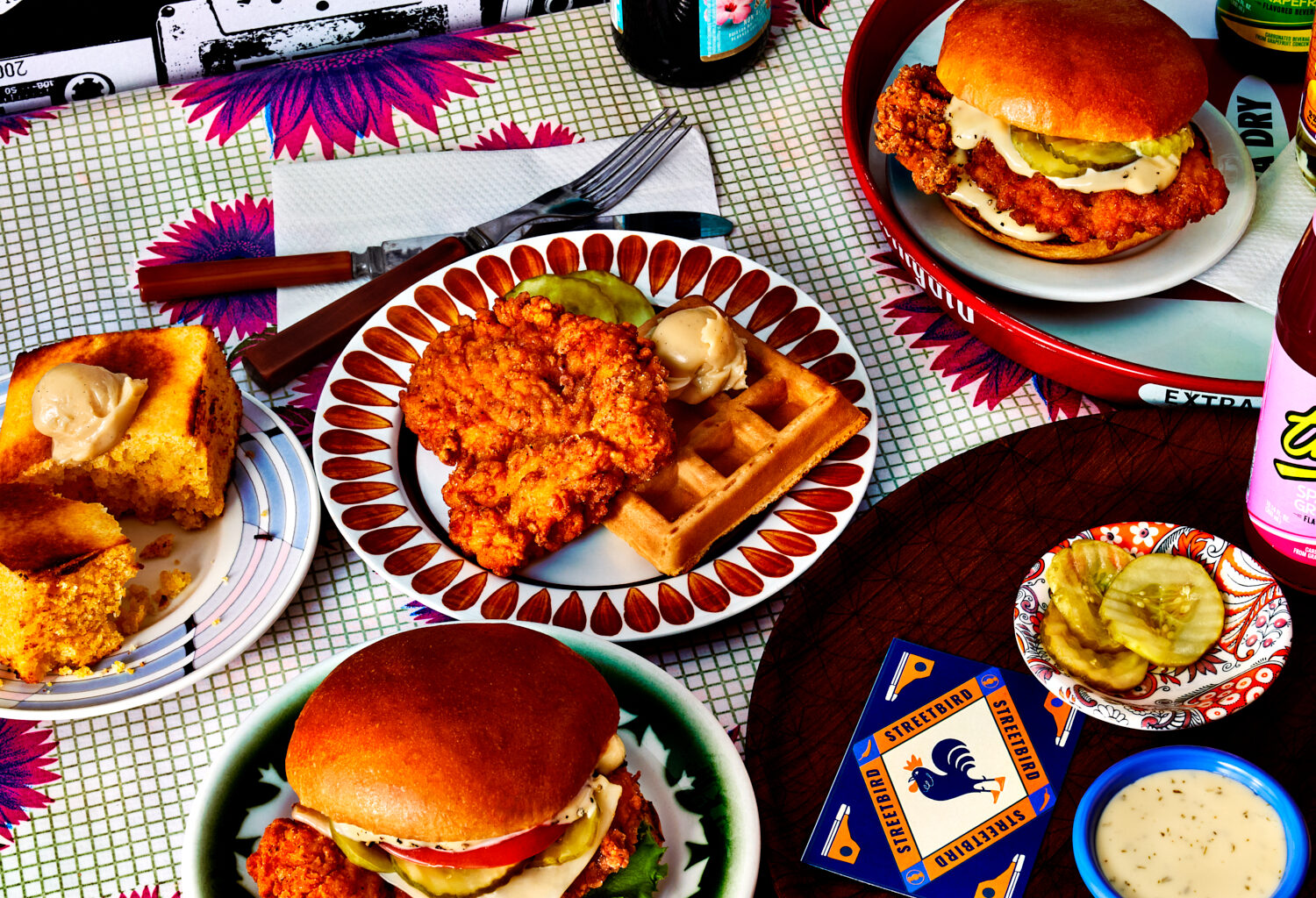Two new food halls are landing in Philly, which raises a question: What’s a food hall, exactly?
Should we be excited, or is a food hall just a glorified version of a food court? Do food halls bring something genuinely different and elevated? Are they all alike? Or are food halls more like snowflakes — no two are created exactly the same, with different business models and food philosophies?
Annie Allman, the CEO of Reading Terminal Market, defined food halls as “a collection of prepared food or dining operators that operate in a shared space.”
While some may think Allman runs the GOAT of Philly Food Halls, they’d be technically incorrect. As a nonprofit organization that also sells raw products, Reading Terminal is categorized as a public market. Still, as an expert in good food, good vibes and good vendors, we asked her what people want to see in a food hall space.
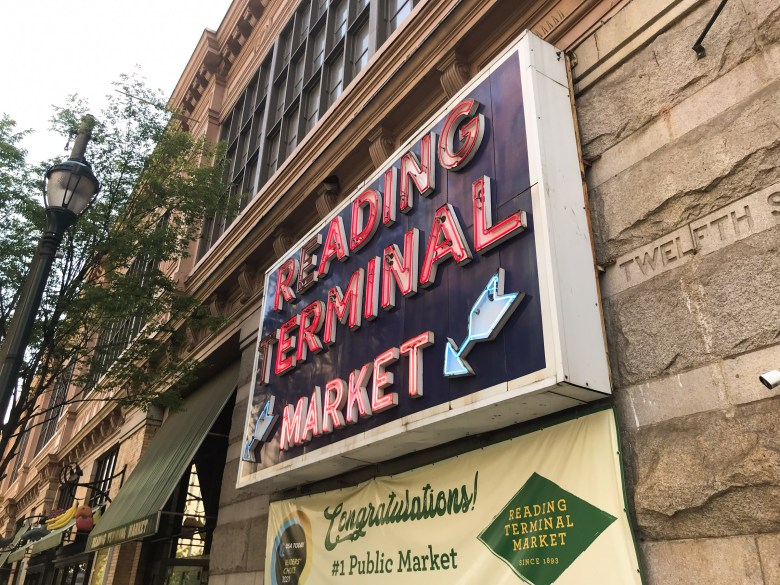 Reading Terminal Market is one of the nation’s oldest and largest of its kind. (File photo/Billy Penn)
Reading Terminal Market is one of the nation’s oldest and largest of its kind. (File photo/Billy Penn)
“Quality,” she said. “Is it authentic? Is it differentiated? Is it consistent? And does it provide good value? It could be a very expensive item but still provide good value, or it could be a less expensive item and still provide good value.”
“There’s really only one Reading Terminal Market, and we both constantly evolve and yet always maintain tradition,” she added. “I’m not sure how some of these other places will position themselves.”
We investigated two recent arrivals on Philly’s food hall scene — Gather and Wonder — to investigate these questions and learn if the new kids on the block will bring something fresh to the table.
Wonder Food Hall
You may have already heard that the Wonder Food Halls are taking Philadelphia — and residents’ social media feeds — by storm. There’s likely already one that just opened in your neighborhood, and if not, one is likely to come soon.
The company is in the midst of a rapid expansion, and plans to open over 10 locations in the city throughout the next few months. Just this year, it has opened locations in Fishtown, South Philly, University City and Rittenhouse.
The company has deep pockets. Mark Lore, The Wonder Group’s founder, chairman and CEO, is a serial entrepreneur with an estimated net worth of $4 billion, according to Forbes. His past projects have included an ecommerce startup, Jet.com, that sold to Walmart and Diapers.com. (Don’t worry, the diaper and food hall ventures are unrelated). He’s also the owner of the NBA’s Minnesota Timberwolves.
Wonder began in New York City in 2018, and shifted to its current model in 2023. Since then, the company has been spreading fast. One differentiator is that it operates “fully integrated kitchens.” Unlike most food halls that have independent vendors, all the food inside is being created by Wonder. Its ethos is about flavor with convenience, and the company recently acquired Grubhub and Blue Apron.
You can download the Wonder App to get food from its vendors, as well as from other spots around the city. The biggest pro is that you can order delivery through Wonder to mix and match cuisines. So if you have picky eaters or dietary restrictions in the family or a friend group, Wonder can cater to a lot of different taste buds. Diners can order a burger from Burger Baby, and then get a side of spiced fries from its Middle Eastern spot, Maydan, no problem.
“When you think about why you go on Amazon, it’s because you can get anything there,” said Jason Rusk, Wonder’s EVP of restaurant operations.
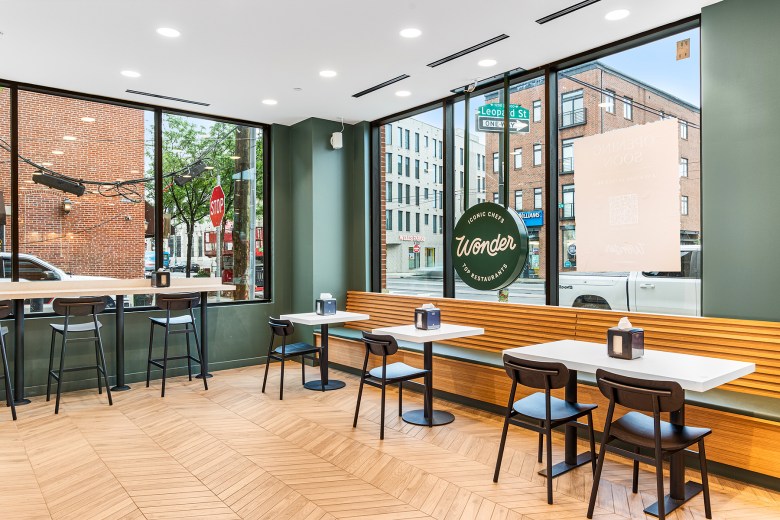 Wonder Food Hall’s Fishtown location. (Courtesy of Wonder)
Wonder Food Hall’s Fishtown location. (Courtesy of Wonder)
“Everyone wants something different,” he explained. “Some people want pizza, someone else wants a salad, somebody else wants Thai. And when you get on some of these third-party apps, you’re kind of left to have to make choices, and somebody loses in that choice. But with us, and what we’re doing at Wonder, you have all the variety, all the different menu options that can come and get delivered to you in one single order.”
Wonder isn’t really adding much by way of culture to the food scene in Philly. Ordering there is not helping a small business, but if you are someone who enjoys eating at Chipotle or Cava and appreciates convenience, it could be for you. Rusk said that the food has been tested and worked out by different chefs — including celebrity and big-name chefs like Bobby Flay and Jose Andres.
“I absolutely love our Detroit brick pizza,” Rusk said. “It is really, really good. It’s a thick-style crust, and the sauce is on top of the cheese, rather than underneath the cheese. It is definitely worth a second Peloton ride, but it’s delicious.”
We at Billy Penn have different food preferences, so this mix-and-match ethos felt ripe for a team lunch order. While certain menus were out of some basic staples — like a chicken option or pico de gallo — overall we enjoyed the meal.
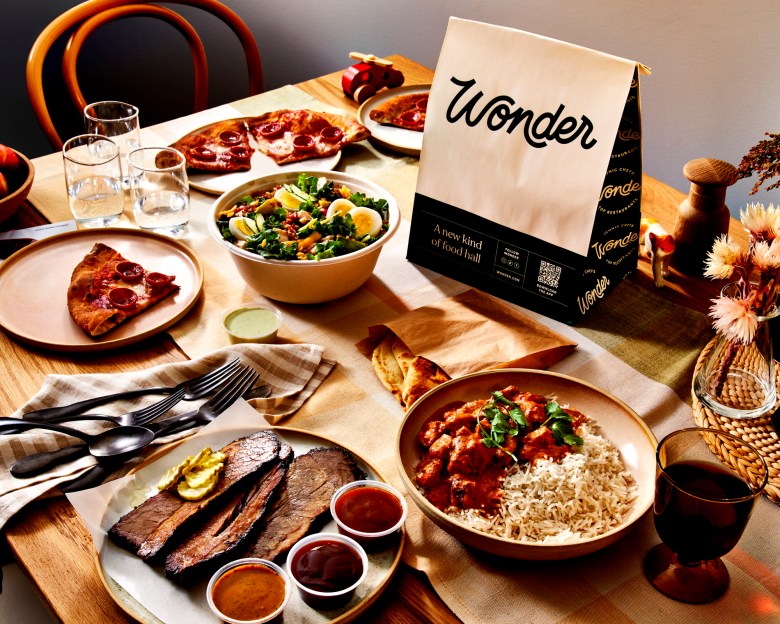 A variety of the offerings at Wonder Food Hall. (Courtesy of Wonder)
A variety of the offerings at Wonder Food Hall. (Courtesy of Wonder)
“I was very skeptical that one kitchen could produce so many different dishes quickly. I assumed the food would not be very good,” one colleague said. “However, my Maydan-branded lunch was pretty nice — the beef kebab was fairly tender, as promised, and the pickled onion, herbs, and three sauces were spicy and tasty.”
The only real miss was a salmon poke bowl, that had strangely al dente rice, was smothered in sauce, and seemingly had tuna mixed into it. Individually, the total came out to around $20 with tax and fees per person, and the food was delivered in under an hour.
“We have integrated our stations into things like cooking groups or assembly line-esque type things that allow you to be able to customize and build to that,” Rusk said. “So rather than operating them separately, [our kitchens] are collectively managed and staged depending on the cook time and how fast something takes, so that everything is prepared at the same time and leaves hot and ready.”
In other words, Wonder operates a bit like a ghost kitchen, but with a brick-and-mortar space that people can actually go and sit down with their food. And certainly, with so many new locations hitting the greater Philly area — Wonder is far from operating like a ghost. Instead, they are big, loud and ready to make their presence known.
Gather Food Hall
While Gather and Wonder are both food halls, their ethos are actually quite different.
Gather Food Hall comes from Hospitality HQ, a Brooklyn-based company that opens food halls across the country. They will be located in the old Bulletin Building, next to 30th Street Station.
Gather is also working with Believe in Students, a Philly nonprofit that provides financial support to food-insecure college students. The idea is to make their food options more accessible and affordable. (Full disclosure: Richard Binswanger, a board member and board chair of Believe in Students, is the author’s uncle.)
Unlike Wonder’s premise of providing endless options, Gather is curating space for just six vendors. For its debut on Oct. 31, it will open with five: Mucho Perú, Sahbyy Food, El Mictlan, Federal Donuts and Bowl’d Masala. The last vendor spot is TBD as of this publication.
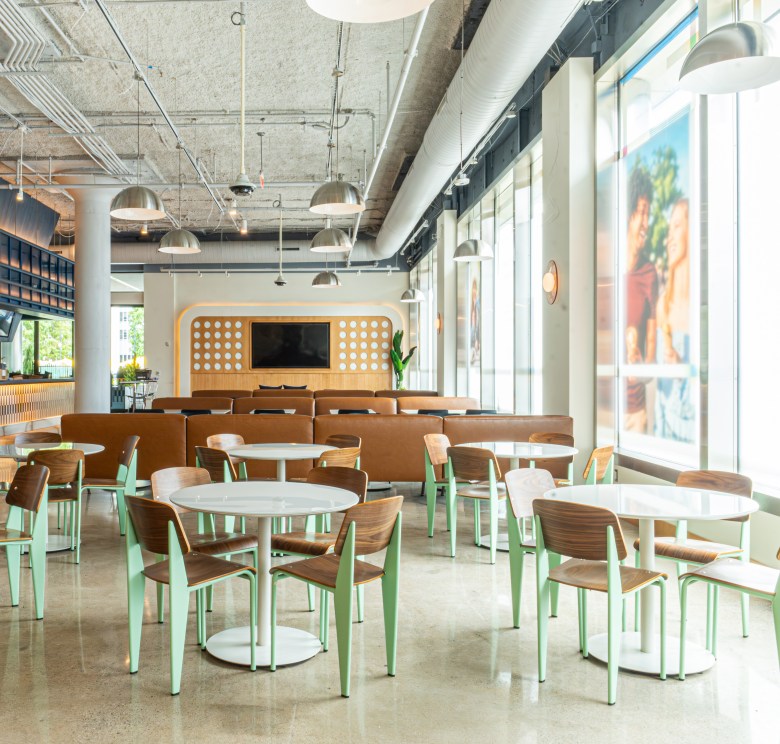 Gather Food Hall will open on Oct. 31 at the Bulletin Building in University City. (Courtesy of Brandywine Realty Trust)
Gather Food Hall will open on Oct. 31 at the Bulletin Building in University City. (Courtesy of Brandywine Realty Trust)
The food hall will also have a “Bulletin Bar,” in honor of the old newspaper, where you can sit and grab a drink.
“Having a variety of options in one central location is ideal for people to be able to walk around and see the different types of food — maybe foods you would never typically eat,” said Emily Uliano, Gather’s public relations representative from Cashman & Associates. “You’re going on your lunch break, and you take a lap around Gather, and you’re introduced to all of these really cool and, for the most part, locally rooted international vendors.”
If some of Gather’s vendor names sound familiar, it’s because four of the five restaurants are local and have already had varying degrees of success in Philadelphia.
El Mictlan is a Mexican and West Coast-style restaurant that has a brick-and-mortar location in South Philly. It’s also recently been featured in the Inquirer’s best of list. Mucho Perú is a Peruvian pop-up, which has been popular around the city and suburbs. Sahbyy Food is a Cambodian vendor from FDR Park’s Southeast Asian Market that earned a Best of Philly nod for its Lemongrass Cheesesteak. Federal Donuts is, of course, Federal Donuts. And Bowl’d Masala, an Indian-fusion spot with comfort food and customizable bowls, is the only vendor not originally from Philly.
Hospitality HQ is run by co-CEO and founders Michael Wetherbee and chef Akhtar Nawab. Wetherbee said that investing in immigrant-run and local vendors is an important part of its business model.
“We’ve had very interesting, I don’t want to say case studies, but examples of how by being present [locally], how that dramatically shifts, moves the dial and lends itself to success,” he said.
In one of these examples, Hospitality HQ worked with a chef who had previously run a successful burger concession stand — and once even worked at the U.S. Open.
The company included the vendor, who had been making as much as $3 million in sales over a summer, into a project in the Midwest, thinking he would serve an ace. However, it was actually a local dumpling vendor that ended up being the food hall’s shining star.
“This was called Kathmandu Momo,” Wetherbee said. “They were three friends. This was their first business. They would sell their handmade dumplings out of the back of a brewery on Friday nights. And so they had no business experience… They did triple the sales of this guy that has 30 years [of experience]. But it’s because they were local. They were in their stall every day. Everybody knew them.”
The team behind Kathmandu Momo has now gone on to open five more locations.
“People were rooting for them,” he said.
Wetherbee also hopes that Gather Food Hall will be a permanent space for its vendors — some of whom come from an immigrant background and are not yet able to afford an entire brick-and-mortar location.
“It’s really a great opportunity for them to start a business and it’s a launchboard for bigger things to come,” he said.
Like most food halls, Gather’s goal is to be a gathering spot for the neighborhood — which, despite being next to a transportation hub, right now is a bit bereft of food options.
“It’s like a desert almost,” Uliano said, describing the choices around 30th Street Station. “There’s not really anywhere to go if you’re early for your train or your train is delayed, just hang out and feel comfortable and safe — like you’re in a really cool, vibrant environment. They do have a full service bar as well, the Bulletin Bar that’s within the food hall. So, I see it as something that is very much a culinary destination.”
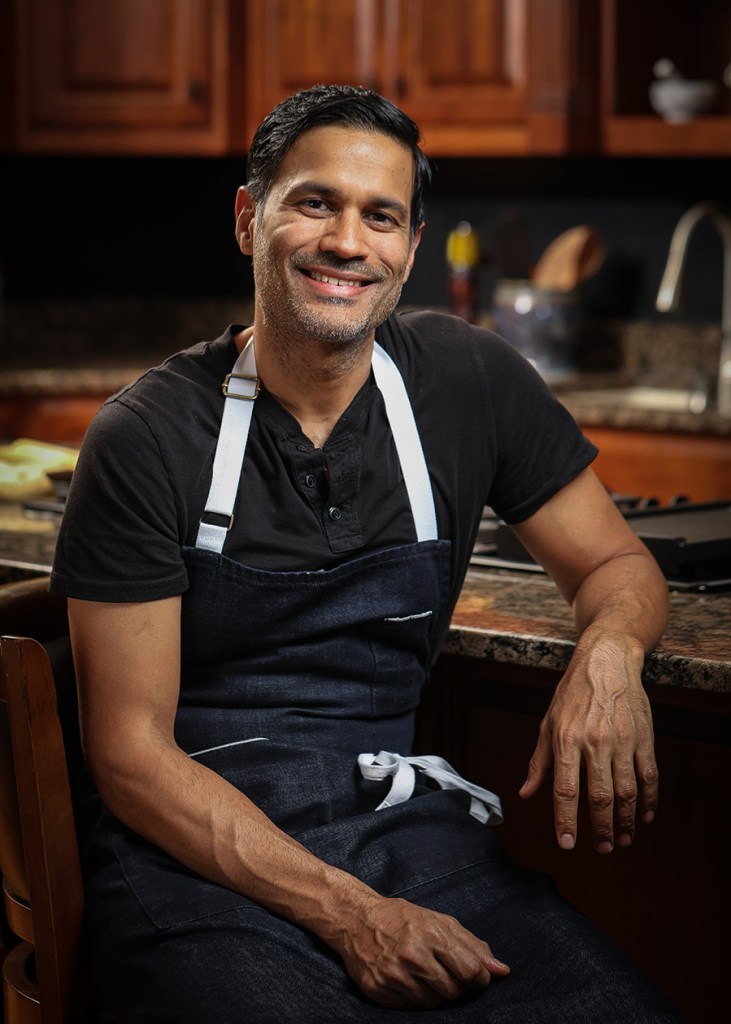 Chef Akhtar Nawab, co-founder of Hospitality HQ. (Photo by Jessica Ebelhar)
Chef Akhtar Nawab, co-founder of Hospitality HQ. (Photo by Jessica Ebelhar)
Gather’s University City location is also purposeful. Through its partnership with Believe in Students, the food hall aims to give out 5,000 free meals to food-insecure students. Brandywine Realty Trust, the developer for the Bulletin Building, made a 10-year, $250,000 commitment to the project.
According to Believe in Students, each vendor is providing one meal option that can be acquired through a gift card provided by participating campuses and nonprofit partners.
Wetherbee said that the pricing for most Hospitality HQ Food Halls range anywhere from $14 to $25 for entrees, but Gather Food Hall is aiming to offer options as low as $12 to make pricing friendly for a student budget.
“It’s hard to focus on school when you’re not sure where your next meal is coming from,” Traci Kirtley, executive director of Believe in Students, said in a statement. “Gather Food Hall is establishing an innovative approach to solving this issue by not only feeding students, but elevating the issue in our public consciousness.”
Finding success
How Gather and Wonder will fare in Philadelphia in the long run is uncertain.
Success is not guaranteed. New York City, a food hall destination, has seen a string of closures in the past few years, including Citizens Market Hall, Gotham West Market, Williamsburg Food Hall and the Market Line.
“Operating costs have spiked so much coming out of COVID,” Allman said, explaining the situation at Reading Terminal. “Over the last couple of years, we have had a deficit in our operating budget.”
As a non-profit, the market has had to focus on its fundraising efforts.
“We do a party for the market to raise money, which tends to close that operating gap,” Allman said. “And then we also get support from other foundations and private individuals, where we participate in the state RACP program, the capital investment program.”
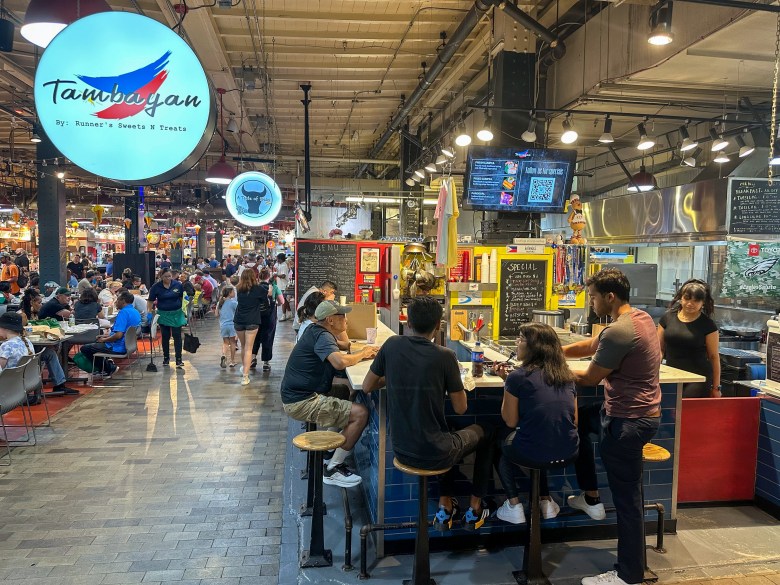 Chef-owner Kathy Mirano watches over the customers filling Tambayan’s Reading Terminal Market counter. (Ali Mohsen/Billy Penn)
Chef-owner Kathy Mirano watches over the customers filling Tambayan’s Reading Terminal Market counter. (Ali Mohsen/Billy Penn)
However, both Gather and Wonder are optimistic that they can become fixtures in the city. Rusk said that the Wonder locations in Philly are off to a promising start.
“I actually have friends in Philadelphia that are talking about [Wonder],” Rusk said. “They bring up the same things — it’s really high-quality food by some great chefs, and I can order across multiple restaurants and get a single delivery. The team members have been really, really great. No matter if we’re in the suburbs like King of Prussia or downtown in Fishtown, it’s been really fun to offer some great opportunities to the team members within the communities which we serve.”
As for Wetherbee, he’s hoping that Gather’s five vendors will be able to make an impact.
“Success doesn’t always mean opening five locations like this Momo vendor, right?” he said. “We really are keen on focusing on diverse cuisine and immigrant cuisine, and especially because we are a minority-owned business … Both of our families, Akhtar and myself, our families immigrated from different countries. So, it’s something that we hold dearly in being also first-time business owners and having started from a small business in one restaurant.”

